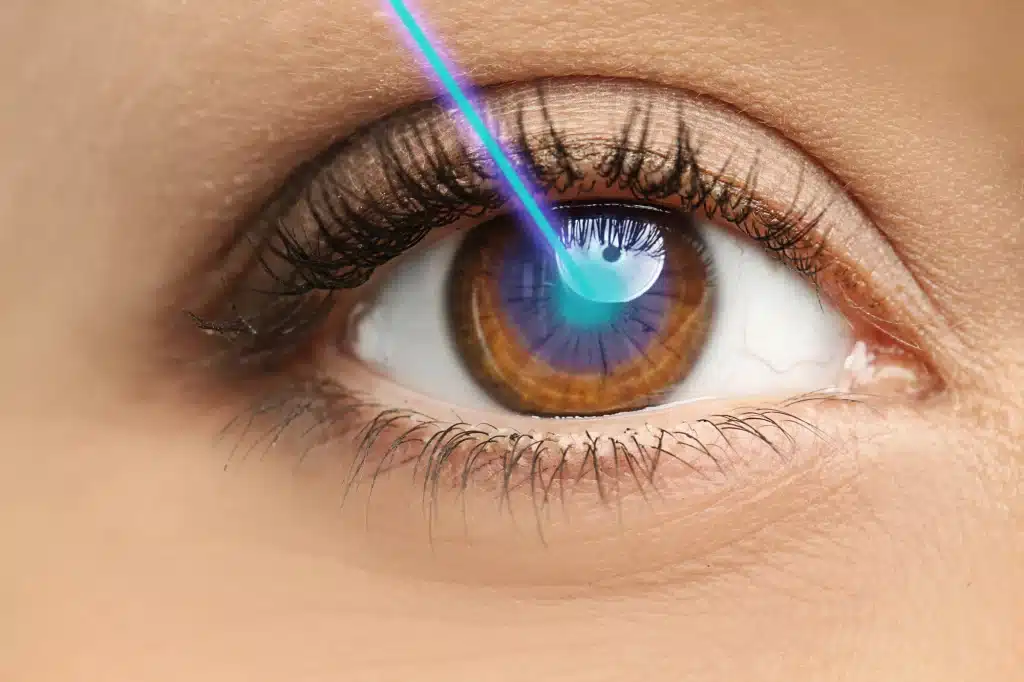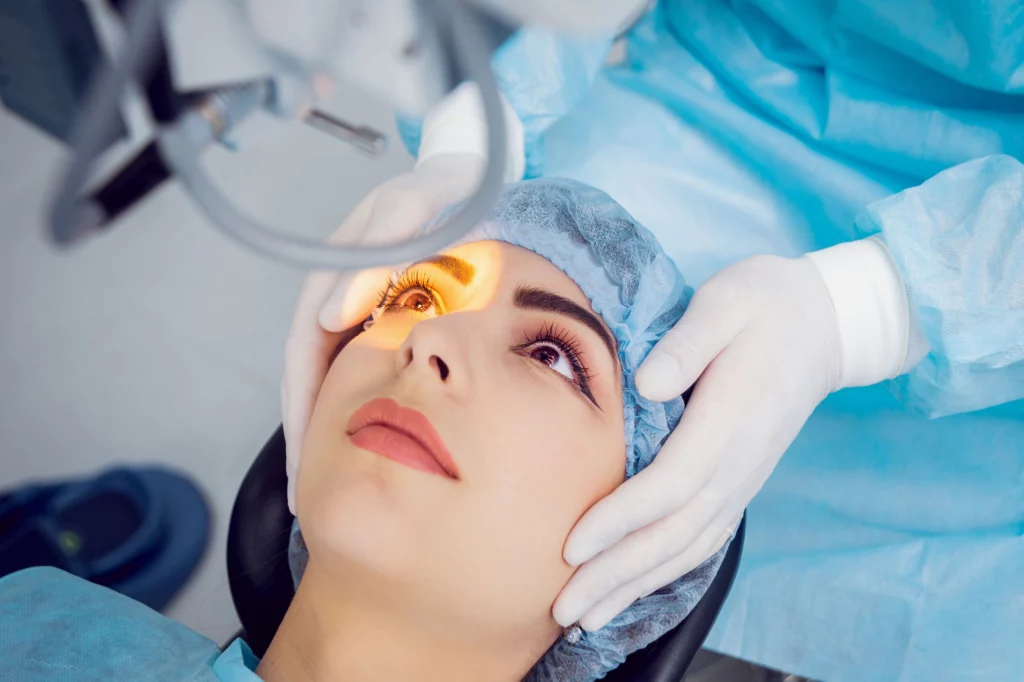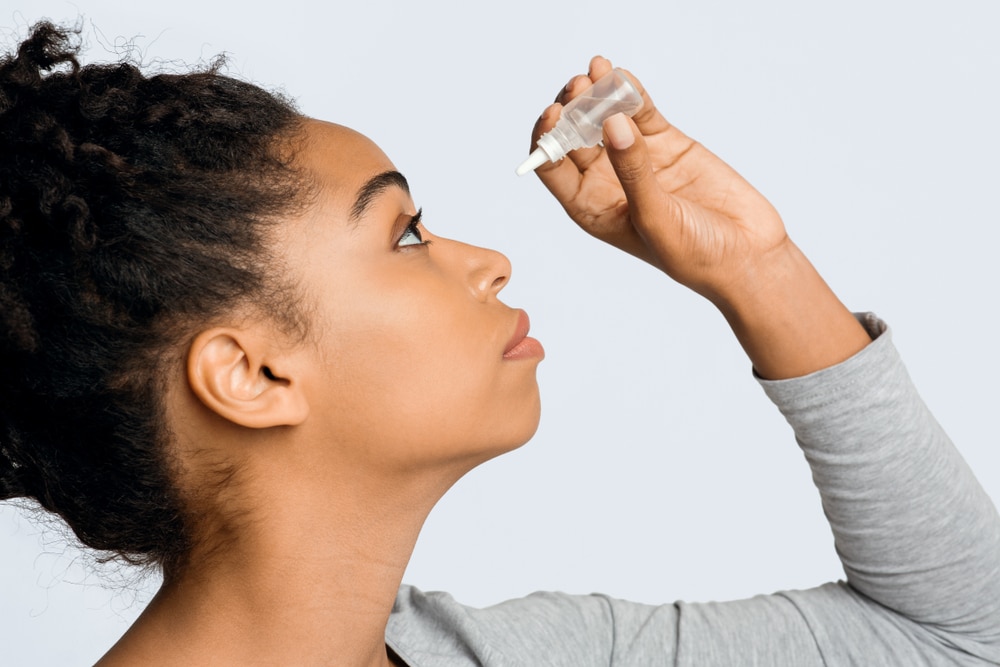Medically Reviewed by: Edward C. Wade, M.D., F.A.C.S.
What is PRK Eye Surgery?
If you struggle with poor eyesight and are looking for ways to correct it without the use of contact lenses or glasses, you may find yourself wondering “what is PRK eye surgery?”
Photorefractive keratectomy (PRK) is an outpatient laser eye surgery that focuses on reshaping the cornea to treat astigmatism, nearsightedness, and farsightedness. The entire procedure takes up to 15 minutes and will likely have you back on your feet in just a couple of days.
You don’t have to live with poor eyesight. See how PRK eye surgery can permanently improve your vision and how it compares to LASIK.
What to expect during PRK laser eye surgery
PRK treats refractive errors in your eyes using a laser to reshape parts of your cornea. This process adjusts the way light is bounced into your retina, improving your eyesight.
Before going into surgery
In your appointments leading up to your PRK surgery, you and your eye surgeon should review the risks, benefits, and costs. He or she will test and examine your vision to determine whether PRK eye surgery is right for you.
Immediately before the eye surgery, you will receive numbing drops in your eyes and an oral sedative if necessary.
During PRK surgery
The surgery itself won’t last longer than 10 to 15 minutes. During the procedure, your eye surgeon will gently remove the top layer of your cornea to expose the part of your eye that needs to be reshaped. This removed outer layer will grow back on its own while you are healing. The laser in PRK, which delivers a pulsing beam of ultraviolet light, is used on the surface of the cornea, not underneath the corneal flap like in LASIK.
Recovery after surgery
You won’t be able to drive for up to a week after the surgery so be sure you have a trusted ride home. There may be some pain or discomfort for the first 24 to 36 hours so you’ll need to ensure that you can get adequate rest, avoid physical activity, and avoid any products that could cause irritation or infection to your eye.
So, how long does it take to recover from PRK eye surgery?
The initial recovery can take a couple of days and may require some pain medication for a day or two. Your doctor will place an eye bandage similar to a contact lens over your eyes while the top layer of your cornea regenerates. There may be some light sensitivity or blurred vision in those first couple of days but your vision should stabilize after the initial recovery.
Full recovery will take about a month but you’ll be back to normal once the eye bandage is removed a few days post-surgery.
PRK surgery side effects
There are a few expected PRK surgery side effects to keep in mind during the first couple days of the healing process including:
- Mild to moderate discomfort or itching
- Light sensitivity
- Seeing halos of light for the first few weeks
- Cloudy or hazy vision
If you notice any unusual symptoms or the above side effects persist, call your ophthalmologist immediately.
PRK vs. LASIK
Chances are if you’re wondering “what is PRK eye surgery?”, you are also curious about LASIK and the differences between the two.
Both laser eye surgeries utilize the same corrective portions when reshaping the cornea with slight variances in how the doctor accesses the cornea. As mentioned, with LASIK, the surgeon will access the surface of your cornea by creating a corneal flap. Whereas during a PRK procedure, the top layer of your cornea, or the epithelium, is removed to allow access to the irregularities needing to be corrected.
Another big difference between the two procedures is their recovery time. Since the hinged flap can simply be realigned after the procedure, your vision will likely be functional immediately after your LASIK procedure.
Wondering why to choose PRK over LASIK? Your ophthalmologist might suggest PRK eye surgery over LASIK if you have certain structural variances, like a thin cornea or dry eyes, that make LASIK unsafe. Your doctor might also suggest you receive PRK after LASIK if you did not receive the desired outcomes.
FAQs
Is PRK worse than LASIK?
One eye surgery isn’t worse than the other. They are both fairly low-risk, dependable procedures with good outcomes. PRK does take a bit longer, has a slightly longer recovery time, and may cause some discomfort following the procedure. But there is less of a risk for dry eyes and/or your corneal thickness to be affected if you already have thin corneas.
Continue reading: Am I a good candidate for LASIK surgery?
Does PRK or LASIK last longer?
The PRK surgery takes a bit longer than LASIK due to the fact that it often requires two lasers — one to remove the epithelium and one to correct the cornea. The entire process is typically done in less than 15 minutes.
How long after PRK can you wear contacts?
Can you wear contacts after PRK? Yes, but you shouldn’t need to. PRK is a refractive surgery that helps correct vision loss. Should you need to wear contacts after the procedure, opt for soft contact lenses as rigid contact lenses may not fit correctly after surgery.
If you are interested in wearing soft lenses or decorative contacts, wait at least six months.
Learn more about PRK eye surgery from a specialist at Eye Center of Texas
Now that you have a better understanding of the answer to the question, “what is PRK eye surgery?” you may be interested in learning whether you’re a candidate for PRK surgery in Houston.
Eye Center of Texas offers years of experience offering the most advanced refractive surgical techniques in Houston including PRK and LASIK. With cornea specialist and surgeon, Dr. Yasir Ahmed, you can rest assured that your vision is in the best hands.
If you’re looking for a permanent solution to vision loss or astigmatism, contact us today to schedule a consultation.
More Helpful Articles by Eye Center of Texas:
- What Causes Floaters and Flashes in Eyes?
- Laser Treatment for Floaters: YAG Laser Vitreolysis
- Presbyopia Treatment Options in Houston
- Can Presbyopia be Corrected with LASIK?
- What Causes Presbyopia?
Related Articles
Financing Options Available
Apply today to find a financing option that meets your needs.
Our Locations
Houston/Bellaire
6565 W. Loop S., Suite 650Bellaire, TX 77401
Medical Office:
713-797-1010
Medical Fax:
713-357-7276
LASIK/Near Vision:
Office: 713-395-1515
Fax: 713-357-7278
Pasadena
4415 Crenshaw RoadPasadena, TX 77504
Medical Office:
281-977-8800
Medical Fax:
281-977-8877
Sugar Land
15200 S.W. Freeway, Suite 130Sugar Land, TX 77478
Medical Office:
281-277-1010
Medical Fax:
281-277-4504
Clear Lake
455 E. Medical Center Blvd., Suite 110Webster, TX 77598
Medical Office:
281-332-1397
Medical Fax:
281-282-9152
Katy
Greenhouse Medical Plaza2051 Greenhouse Road, Suite 110
Houston, TX 77084
Medical Office:
346-547-7070
Medical Fax:
281-214-2971
The Woodlands/Conroe
100 Medical Center Blvd., Suite 118Conroe, TX 77304
Medical Office:
936-647-1610
Medical Fax:
936-647-1620


